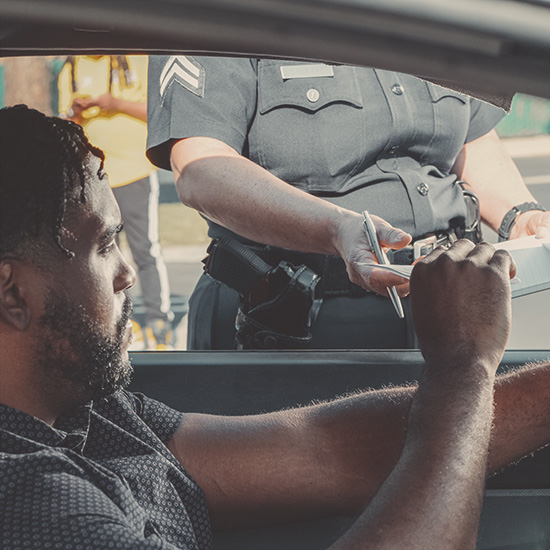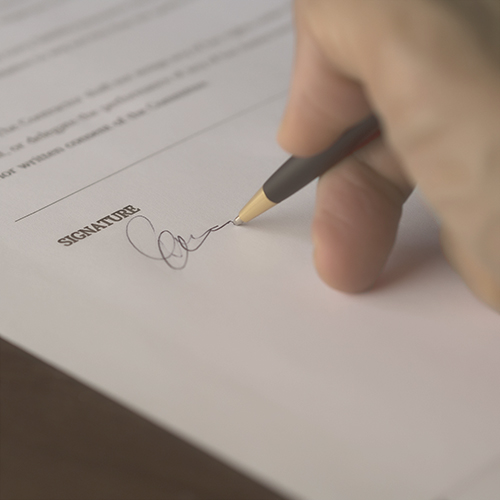Driving While Intoxicated/Driving Under the Influence |



One of the worst things that can happen to a person is being arrested for allegedly committing a crime. It places one of the most sacred rights of a person in jeopardy – their liberty. In the American criminal justice system, a person is innocent until proven guilty but from law enforcement, to judges, to prosecutors, this undeniable right can get lost in the desire for “justice.”
The prosecuting agency, whether it be the State of Texas or the City of Houston, has the highest burden of proof in the entire legal system: beyond a reasonable doubt. The prosecutor’s job is to fight for justice but most often, they fight for a conviction. They don’t scrutinize their evidence to see if it meets the beyond a reasonable doubt burden; that’s the job of a highly-skilled criminal defense attorney and the attorneys at Alonso & de Leef, PLLC are more than capable of that task.

Under Texas Law, you can be convicted of driving while intoxicated if you are found guilty beyond a reasonable doubt of operating a motor vehicle in a public place while intoxicated, which means he or she has a blood alcohol content (BAC) of 0.08% or higher or lacks the normal use of their mental or physical faculties because of the use of alcohol or drugs. A first offense, generally, is a Class B misdemeanor with a range of punishment from 72 hours to 180 days in jail and/or a $2,000 fine. From there, the State can use other factors to increase, or enhance, the penalty range including, but not limited to, whether:
Driving under the Influence, or DUI, is slightly different than DWI. If a person under the age of 21 is pulled over and has any alcohol in their system, they will be charged with DUI. If a person under 21 is pulled over and found to have a BAC of greater than 0.08%, they can be arrested for DWI. The punishment range for DUI can include a fine up to $500, a license suspension, community service hours, and a mandatory alcohol-awareness class.
An arrest or conviction for DWI not only results in criminal consequences but can also lead to administrative consequences such as license suspension. If you refuse or fail a breath or blood test, your license could be suspended from 90 days to 2 years, depending on the circumstances. In order to prevent this you must request a hearing within 15 days of receiving a “Notice of Suspension” otherwise the suspension will go into effect 41 days after you receive the notice.
The attorneys at Alonso & de Leef, PLLC are experienced in DWI/DUI law and criminal, administrative, and immigration consequences of both. If you have any questions about DUI or DWI law or the immigration consequences of each, it is imperative that you contact an experienced attorney before you make a decision that could affect your future. Call today to schedule a free consultation.

Driving While Intoxicated/Driving Under the Influence |

Drug Offenses |
Texas takes drug offenses very seriously and pursues them relentlessly in prosecution. If you are accused of a drug offense, not only are your rights and freedoms on the line but, if you are anything other than a citizen of the United States, your legal status will be affected. Whether you’re looking at a Class C misdemeanor or a first-degree felony drug offense, you have the right to have an experienced attorney by your side fighting to defend your rights.
Under Texas law, a person can be arrested or convicted if they are found to be in possession of, or manufacture or deliver a controlled substance as defined in the Texas Controlled Substances Act. They include both illegal drugs such as marijuana, cocaine, and methamphetamine, along with legal prescription drugs such as Adderall and Xanax.
The punishment range for a violation of these laws depends on various factors including the type of drug, the amount of drug, and whether you are in possession, delivery or manufacture. For example, possession of less than 2 oz of marijuana is a Class B misdemeanor but a state jail felony if the amount is more than 4 oz but less than 5 lbs.
You need an experienced attorney on your side to explain the specific offense you are accused of committing and the penalties, both criminal and otherwise, before making a decision on your case. We at Alonso & de Leef, PLLC are willing and able to assist and guide you through the process.
One of the most common offenses in Texas is assault. It covers a range of charges from simple assault to assault – family member to aggravated assault with a deadly weapon, each with their own complications.
Actions that can result in a charge of assault include:
A basic assault offense can be charged as either a misdemeanor or a felony depending on the circumstances. It starts as a Class A misdemeanor and then, depending on circumstances, injury, and weapons used, the punishment range can increase.
Family violence offenses, though based on the simple assault statutes, are taken as some of the most serious offenses in Texas and are prosecuted as such. A person can be charged with a family violence crime if they threaten or cause bodily injury to a family or household member including spouses, former spouses, roommates, people in a dating relationship whether or not they live together, and any relatives living together.
A family violence conviction will have consequences for years to come. In some cases, a person with a conviction for family violence can be denied access to a child or prohibited from owning a firearm. The consequences are even more severe for a person who does not have United States citizenship: they could lose any current legal status or the right to apply for legal status.
The attorneys at Alonso & de Leef, PLLC understand the serious nature of these offenses and the severe consequences that can result from a conviction. Whether it will impact a pending or potential family law matter or a person’s legal status, we are here ready to provide high-quality legal defense tailored to each particular client. Call today to schedule a free consultation.

Assaultive Offenses |

Prostitution |
It’s said that prostitution is the oldest living profession. Texas regulates both the selling and the buying of sexual favors and the punishment differs depending on if you are the person selling or buying and how many times you’ve been charged with the offense previously.
There is no requirement for any actual exchange of money or actual sexual act to occur for the charges to be brought. All that is required is the offer and agreement to exchange sexual conduct for a fee. Therefore, it is imperative that you not make any decisions without contracting an experienced attorney to review the evidence and make sure the state is able to prove guilt beyond a reasonable doubt. A conviction for prostitution can ripple out into every area of your life, especially for individuals who do not yet have either legal status or United States citizenship. Our office has experience dealing with these types of charges and are here to fight your case.
There are many different charges that can fall under theft or fraud offenses. No matter how small the charge, any conviction for theft or fraud can permeate throughout your life whether it is job related or immigration related. The attorneys at Alonso & de Leef, PLLC are experienced with theft/fraud cases ranging from a simple Class B misdemeanor shoplifting all the way up to first degree felony Fraudulent Use or Possession of Credit Card or Debit Card Information. Here is a brief list of the types of cases we handle:
Credit or Debit Card Fraud as well as Fraudulent Use or Possession of either Identifying Information or Credit Card or Debit Card Information are all extremely complex and technical charges that require specific forms of evidence to hold the state to their burden of beyond a reasonable doubt. You need an experienced attorney on your side to scrutinize and explain the evidence and your options so that you can make the right decision in your case. We at Alonso & de Leef, PLLC are willing and able to assist and guide you through the process and fight for you.

Theft/Fraud Offenses |

Weapons Offenses |
In Texas, where guns are a tradition, the Second Amendment is a highly valued right. If someone doesn’t own a gun, they know someone who owns one or more guns whether they are for personal protection or recreational hunting. Texas law regulates the situations when it is legal and when it is not legal to carry a weapon and the ways you must carry the weapon for it to be legal.
If you are arrested for an offense alleging unlawful carrying of a weapon, whether you are or are not a License to Carry holder, you need experienced representation to fight your case and maintain your rights as a conviction for a weapons offense could result in the loss of the LTC or the loss of the right to possess a firearm at all.
The general Unlawful Carrying Weapons statute found in Section 46.02 of the Texas Penal Code states that a person commits an offense if they intentionally, knowingly or recklessly carry a handgun on their person and they’re not in their own home or property they control or inside their own motor vehicle or in route to their own motor vehicle.
Even if the person is in their own motor vehicle or watercraft or a motor vehicle or watercraft under their control, a person violates the statute if:
Generally, a violation of this statute is a Class A misdemeanor but can increase depending on various situations. These regulations also differ for LTC holders as well as police and other government officials. If you are charged with a weapons offense, contact the experienced attorneys at Alonso & de Leef, PLLC for a free consultation to discuss your options.
The attorneys at Alonso & de Leef, PLLC are here to defend you in traffic ticket court. Before you pay the fine, let us protect your driving record and prevent possible suspension of your license, including commercial driver’s licenses. Our traffic attorneys handle court procedures for moving violations, speeding, red light tickets, failure to appear warrants, and no insurance violations, among others.

Traffic Tickets |
Houston and the Harris County area are vast. There’s no getting around the need to drive whether it’s to work, the grocery store or driving the kids around town. It’s almost impossible to do daily activities without a license. So what can you do when your driver’s license gets suspended?
Under most circumstances, you can apply for an Occupational Driver’s License that will allow you to drive to and from work and for the essential needs. There are some circumstances where you are not eligible for an Occupational Driver’s License and the law governing them changes frequently.
The attorneys at Alonso & de Leef, PLLC have over 20 years’ experience with driver’s licenses both Class C and Commercial Driver’s Licenses. Contact us for a free consultation to determine your eligibility and the steps necessary to regaining your ability to legally drive.

Occupational Licenses |

Non-Disclosures And Expunctions |
Having a criminal conviction on your record can hinder a person throughout their life. It makes it harder to apply for a mortgage, a job, rent an apartment, or volunteer at your children’s school. Criminal records are public record and the Internet has made it easier and easier for employers or anyone with an Internet connection to access your background, criminal record, and even arrests. Everyone has mistakes in their past that they regret but with the ease of access to this type of information, people are able to prejudge a person based on a simple Google search. Fortunately, the legislature took this into account and developed two different mechanisms to help clear a criminal record: Non-Disclosure and Expunction.
Non-Disclosure is a fancy term for sealing a record. It does not eliminate the records but limits the number and type of people who are able to access the information. Being granted an Order of Non-Disclosure means you do not have to disclose the criminal conviction on a mortgage application, job application, school applications, among others. It applies only to specific offenses; it does not apply to a person’s entire criminal record and each separate conviction must qualify and have its own application. A person is eligible to have their criminal case/conviction non-disclosed under very limited circumstances. Generally, there are eight different categories of offenses eligible for non-disclosure contained in Texas Government Code, Chapter 411, each with their own qualifications and procedures. There are specific circumstances where you may not be entitled to a non-disclosure and the attorneys at Alonso & de Leef, PLLC can assist you with this process.
An expunction is a highly sought-after legal remedy that permanently erases an offense from your criminal record so that no one will have access to it, including police, courts, and the state government. The Texas Government Code has placed strict eligibility requirements over the types of cases/convictions that can be expunged and even then, there are some government agencies that will always have access to your information.
An expunction may be available in these limited circumstances:
The procedures for an Expunction and Non-Disclosure vary depending on your circumstances and these issues can be complex. Just because you appear to qualify under one of the above categories isn’t a guarantee that you actually qualify or will receive a Non-Disclosure or Expunction. The attorneys at Alonso & de Leef, PLLC can review your specific circumstances and advise you on what remedy you qualify for.
| Cookie | Duration | Description |
|---|---|---|
| cookielawinfo-checkbox-analytics | 11 months | This cookie is set by GDPR Cookie Consent plugin. The cookie is used to store the user consent for the cookies in the category "Analytics". |
| cookielawinfo-checkbox-functional | 11 months | The cookie is set by GDPR cookie consent to record the user consent for the cookies in the category "Functional". |
| cookielawinfo-checkbox-necessary | 11 months | This cookie is set by GDPR Cookie Consent plugin. The cookies is used to store the user consent for the cookies in the category "Necessary". |
| cookielawinfo-checkbox-others | 11 months | This cookie is set by GDPR Cookie Consent plugin. The cookie is used to store the user consent for the cookies in the category "Other. |
| cookielawinfo-checkbox-performance | 11 months | This cookie is set by GDPR Cookie Consent plugin. The cookie is used to store the user consent for the cookies in the category "Performance". |
| viewed_cookie_policy | 11 months | The cookie is set by the GDPR Cookie Consent plugin and is used to store whether or not user has consented to the use of cookies. It does not store any personal data. |
